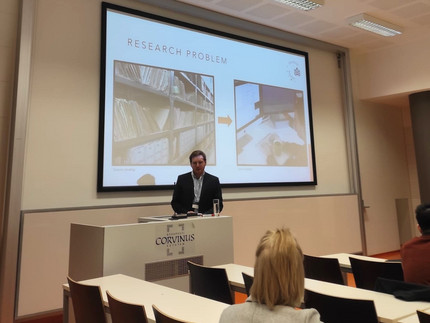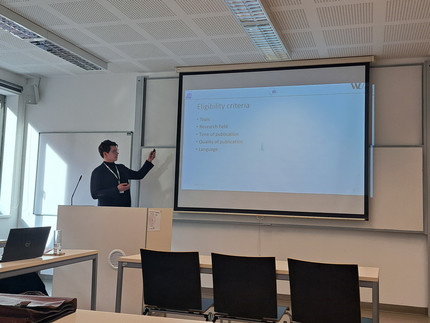Nicolas Drathschmidt and Jakob Kühler present research results at the IRSPM Conference 2023
The two academic staff members presented and discussed their recent articles on "Digital Red Tape" and "Digital Transformation in Local Governments" at the IRSPM 2023 conference in Budapest. The conference is a leading event for international researchers in the field of public management and addresses current issues and challenges in the public sector.
Nicolas Drathschmidt examined how digital technologies influence bureaucratic processes in public administration. Jakob Kühler, in turn, presented a literature review on "Digital Transformation in Local Governments" together with Tobias Polzer from the Vienna University of Economics and Business Administration, which was produced as part of the DIGILOG project. Both presentations stimulated interesting discussions on the multi-layered implications of digitalisation on the management of public organisations.
Red Tape 4.0 – Digital era, same bureaucracy?
Abstract: The impact of digital technologies on the public sector has been substantial, and the COVID-19 pandemic has accelerated this digital transformation. The promise of digitalization is to cut red tape and increase efficiency, but it is unclear whether the transfer of analog processes to the digital sphere will eliminate compliance burdens. This paper seeks to investigate how public employees perceive digital red tape and whether different forms and sources of red tape have different effects. Using an online survey experiment with German public sector employees, the study will explore the relational nature of red tape through the lens of appraisal-theory and highlight the need to improve processes alongside the introduction of digital technologies.
Digital Transformation of Local Government Services in Europe. A Structured Literature Review
Abstract: Digital transformation is expected to fundamentally reshape service delivery, internal organisation of administration and has wider governance implications. This article presents a structured literature review on digital transformation in local government in Europe in public service delivery in order to consolidate knowledge and highlight trends. 45 academic studies in English that were published between 2010 and 2022 are analysed. We (1) analyse the focal themes of digital transformation research at the local government level, (2) the influential factors and effects of digital transformation and (3) show possible avenues for future research. The results of our literature review show that regarding influencing factors, most studies look at the micro level, with preferences and competencies of personnel, new management positions and characteristics of technology as the most salient issues. On the macro level, influencing factors may be grouped into socio-economic, demographic, institutional factors and external catalysts. Regarding the effects of digital transformation, most studies in our sample either examine output factors (such as e-maturity, efficiency, effectiveness and process changes and new requirements for leadership) or, but less so, outcomes (such as service performance, responsiveness, changes in workload and transparency), whereas impacts are less studied. Still, the effects of digital transformation projects are so far only poorly understood and should be further inquired. We also identify a geographic and size bias in existing research, which should be addressed by particularly analysing the situation in Central and Eastern European countries and smaller municipalities. Furthermore, cross-countries and over-time comparative research is largely missing and needs more attention.



